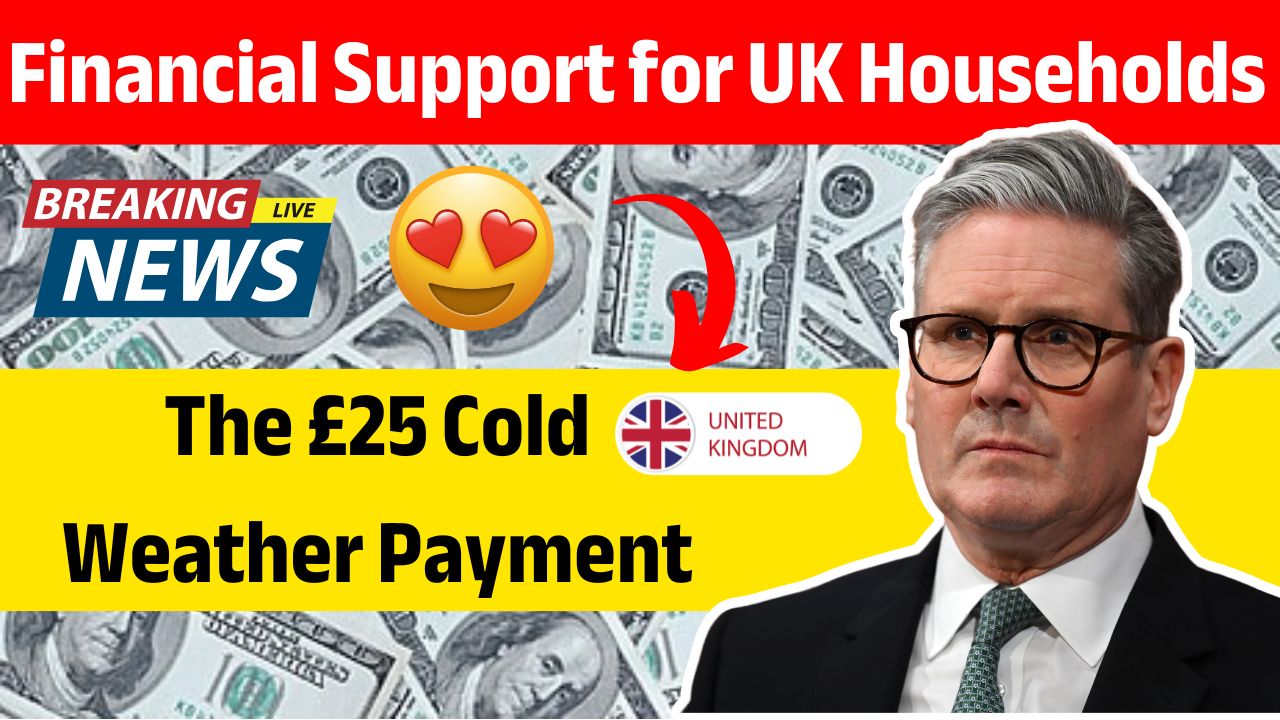Financial Support for UK Households : As winter sets in, many households across the UK face rising heating costs. To help manage these expenses, the Department for Work and Pensions (DWP) provides several financial aid schemes, including the £25 Cold Weather Payment. This initiative offers support to eligible households, helping them cover their energy bills during extreme cold spells.
What is the £25 Cold Weather Payment?
The Cold Weather Payment is a government-backed scheme that grants £25 to eligible individuals for every seven-day period in which the temperature in their area is recorded or forecasted to be 0°C or lower. Running annually from November 1 to March 31, this scheme ensures that vulnerable households receive essential financial assistance during the coldest months.
Who is Eligible for the Payment?
To qualify for the Cold Weather Payment, recipients must be claiming one of the following benefits:
- Pension Credit: Designed for pensioners on low incomes
- Income Support: Financial aid for those with little or no income
- Income-based Jobseeker’s Allowance (JSA): Assistance for unemployed individuals actively seeking work
- Income-related Employment and Support Allowance (ESA): Support for individuals unable to work due to illness or disability
- Universal Credit: A benefit for individuals or households with low income, whether employed or unemployed
Some claimants may also qualify based on specific conditions, such as having a child under five or receiving a disability premium.
How Does the Payment Process Work?
The Cold Weather Payment is automatically issued, so recipients do not need to apply. When temperatures drop to the required threshold for seven consecutive days, the payment is processed and should be deposited into the recipient’s bank account within 14 working days. The transaction will typically appear with the reference “DWP CWP,” along with the recipient’s National Insurance number.
Other Winter Support Schemes
In addition to the Cold Weather Payment, the DWP provides various other financial assistance options to help households manage winter expenses:
- Warm Home Discount: A one-time £150 discount on electricity bills for eligible pensioners and low-income households, applied between October and March
- Winter Fuel Payment: A tax-free sum ranging from £100 to £300, available to individuals born before a specified qualifying date to help with heating costs
- Household Support Fund: Allocated to local councils, this fund offers financial aid for essentials like food, energy bills, and clothing, with some councils providing up to £600
Recent Government Initiatives
To address the ongoing cost-of-living crisis, the government has introduced additional financial support:
- Cost of Living Payments: As of February 2024, more than eight million households received a total of £2 billion in financial support to help cope with rising living expenses. These payments were deposited automatically into eligible accounts.
- Household Support Fund Extension: The fund has been increased by £842 million, ensuring that local councils can continue offering aid to vulnerable households until March 2025.
Checking Eligibility and Payments
To confirm eligibility for the Cold Weather Payment or other financial aid programs, individuals should:
- Check Their Benefits: Ensure they are currently receiving one of the qualifying benefits
- Monitor Local Temperatures: Stay updated on weather conditions, as DWP relies on designated weather stations to determine eligibility
- Contact the Relevant Authorities: If eligible but no payment has been received, individuals should contact their pension centre, Jobcentre Plus, or the Universal Credit helpline
Final Thoughts
The £25 Cold Weather Payment and other DWP support schemes play a crucial role in assisting vulnerable households during the winter months. By understanding the eligibility requirements and available assistance, individuals can better manage their heating costs and other essential expenses. Staying informed and proactive ensures that those in need receive the financial support they are entitled to, reducing the strain of colder temperatures and rising energy bills.




